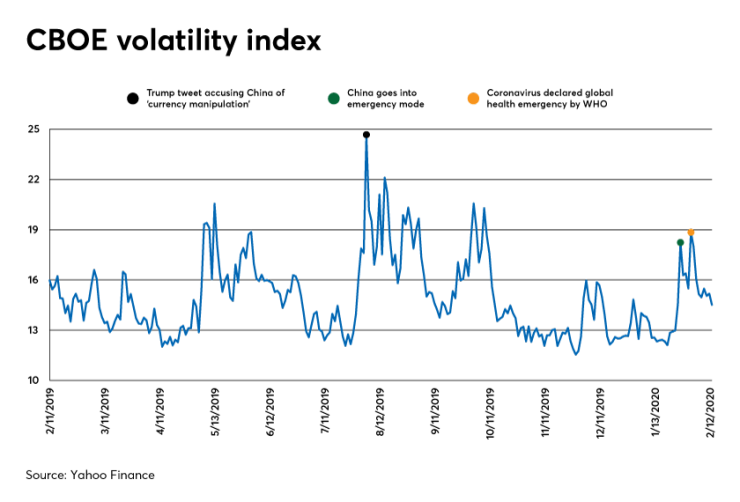Will coronavirus have a material impact on client portfolios and what should we be telling them?
There’s little doubt the epidemic is serious. As of Feb. 11, more than 1,000 people had died from the virus and more than 43,000 appear to have been infected in more than 29 economies throughout the world. I say “appear” because, in reality, the actual numbers of infections and fatalities are not fully known or, in the case of numbers quoted by the Chinese government, widely disputed.
Some financial planners and analysts have sought to ease client worries, reminding them that other global health threats, such as SARS, and H1N1, significantly impacted global markets in the short term. But the effects did not prove catastrophic in the long term. During the SARS crisis, for example, China’s GDP that year slipped only about 1%.
That was then. But between the 2003 SARS crisis and the current coronavirus epidemic, the Chinese economy, its global supply chains and its population have significantly changed. China now accounts for about one third of global economic growth, compared with about 4% in 2003.
Given that China’s economy has been slowing, coupled with higher rates of unemployment, coronavirus will have a far greater and more protracted impact. A reasonable assessment is a decline of between 0.1% to 0.3% of global GDP — with a full recovery this year if China can contain the majority of infections. If infections continue to spread, I predict a systemic decline for China’s economy and more volatility for global markets.

It has surprised me that some of the U.S. clients with whom I’ve spoken to have not realized how this epidemic could impact their portfolios.
In one case, a client told me he was confident in the long-term strategy we had developed and did not feel any immediate changes were needed. Yet after I explained how stock markets have gyrated recently, it changed his perspective. He then asked for recommendations on what he should sell from his portfolio to free up cash so we would be well positioned to buy into equities at cheaper prices in case of a future market correction.
On the other end of the spectrum, I spoke with a client who was very concerned about her portfolio saying, “Should I be taking proactive steps to protect my portfolio or are there opportunities that I should be exploring here as well?” Another client felt the coronavirus would be similar to the SARS epidemic: Short-term it would impact the financial systems of the U.S. and China, but long-term impact would be fairly negligible as the broad fundamentals of China and the US economy are strong.

In China however the story is much different. One of our institutional clients based in Shanghai said the impact has been acute, noting how China’s stock market tumbled almost 8% on Feb. 3 when traders returned from a two-week holiday. Therefore, this firm has proactively identified and implemented ways to diversify their portfolios and hedge the significant volatility. For example, senior management had accelerated investing in companies and regions based outside of China, primarily in frontier markets. This is consistent with the “China-plus-one” hedging strategy of investing in countries such as Vietnam, Thailand, or Singapore.
U.S.-based RIAs have told me they are recommending clients look to commodities and gold. Will the coronavirus have a material impact on client portfolios? The answer is yes.
I would pay special attention to manufacturing, healthcare, pharmaceuticals, oil & gas, hotel and travel. Global firms such as Under Armour said the outbreak could lower sales by $50-$60 million during the fiscal first-quarter as they have over 600 shops in China which sent its shares tumbling. Apple, Starbucks, Ikea and other companies like Yum China Holdings — the operator of KFC and Pizza Hut — have had to either fully shut down production or significantly reduce operations in multiple cities throughout the mainland, which will have a direct impact on earnings. The central bank is “closely monitoring” COVID-19 for a potential hit to China and the global economy, Chairman Jerome Powell said in testimony before the House Financial Services Committee.

When communicating with clients, being proactive is critically important. Calling them and/or sending them information garners trust, demonstrates decisive leadership and augments how they perceive your resourcefulness. Here's one note to pass on: The SEC recently warned investors to be on alert for scams related to the pandemic — like investing in microcap companies that claim to have a cure for COVID-19.
On December 31, China reported the first case of the coronavirus to the World Health Organization. In less than seven weeks, we have seen unprecedented disruptions in global supply chains and significant global market volatility. Many compare the economic impact of this epidemic to SARS, but you will find stark differences when you examine the cases more closely. We often hear that, unless we learn from the past, we are doomed to repeat it. It’s also important to recognize when we are in uncharted territory.
With additional reporting by Guannan (Nancy) Xiao and Yijie Liu.





